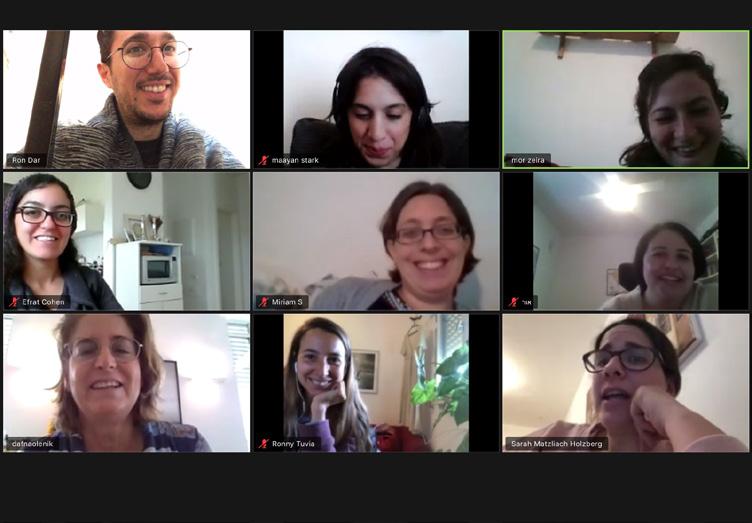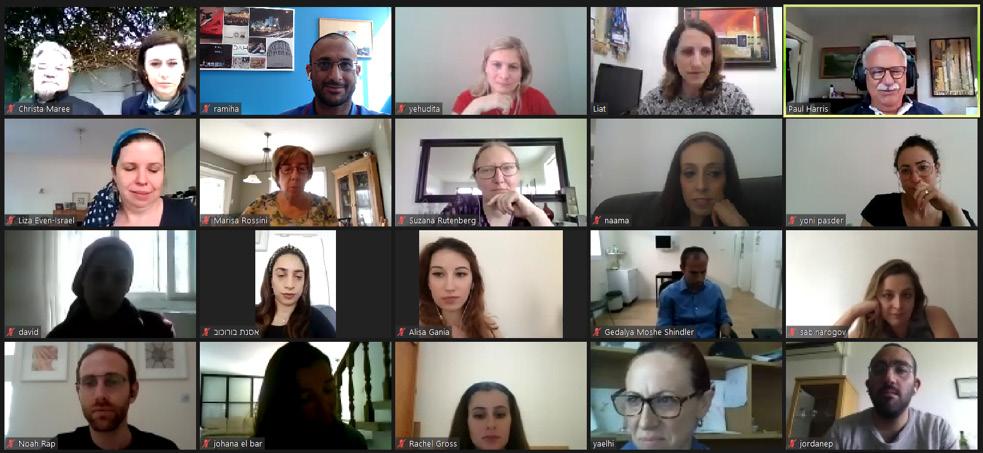
4 minute read
See you in September? Coping with COVID-19 On and Off Campus
from ORAH SUMMER 2020
by CHW
See You in September?
Coping with Covid-19, On and Off Campus
The buzzing lecture halls, vast social networks and packed events are what draw students to a college. But, they are also what make campus life a hazard during a pandemic. Following the first confirmed cases of COVID-19 in Israel, a state of emergency was declared and all educational institutions were forced to halt in-person classes, indefinitely.
Four months on, campuses are still off limits. Students have yet to hear if they will be able to return to campus in the fall, as authorities and educational leaders continue to assess if, when, or how they might be able to safely resume classes in the upcoming academic year.
Yet, new data from a recent study conducted at Hadassah Academic College (HAC) can shed important light on the issue. Professor Avi Besser, Head of the Department of Communication Disorders, was actively involved in the swift transition to synchronous, online classes. And while the technicalities of the switch were seamless, within the first few weeks of distance learning, Professor Besser began to notice growing signs of distress and anxiety among many students, or so it seemed.
As an educational psychologist, Professor Besser was highly attuned to the negative impact prolonged uncertainty and stress can have on individuals. He spent years examining the communities bordering Gaza to assess the effects of the complex emergency, including daily rocket attacks.
Quick in crisis situations, Professor Besser immediately set out to investigate the impact of the pandemic on locked-down students. While much of the focus around COVID-19 was initially based on preventing the spread of the virus and maintaining one’s physical health, Professor Besser was keen to understand the impact of the pandemic on the mental health and coping strategies of students.
Computers donated to HAC for E-Learning in the wake of COVID-19
An online questionnaire was sent to thousands of students across a number of academic institutions in Israel with a quick turnaround of 1,217 responses. The survey clearly revealed that the sudden shift to distance learning was, in fact, negatively impacting the overall cognitive abilities, emotional wellbeing and mental health of the vast majority of students.
In comparison with face-to-face classes, the fresh data demonstrated that students felt higher levels of stress, anxiety, frustration, helplessness and even boredom. They also felt a decrease in their sense of optimism, satisfaction and enjoyment around learning. Without access to a vibrant campus life, students felt a greater sense of loneliness and lost their sense of ‘belonging’. Students also felt largely ignored, less visible and unimportant as they struggled to sit through an average of 7-10 Zoom classes per week.
The vast majority of students stated a significant decrease in their levels of attention and concentration. Their ability to retain information and apply the material being taught was hampered. Additionally, students admitted they felt less committed to learning and related a sense of frustration, as they did not feel they were able to meet the goals they had originally set for themselves.

The analysis factored in the background of students, such as age, gender, marital status, employment and financial status. It also took into account student living arrangements and whether they lived alone or with others during lock down. In doing so, the research debunks many assumptions as to who was faring better during the pandemic: introverts or extroverts. While social media was flooded with posts about lock down being an ‘introvert’s paradise,’ the findings suggests otherwise. The research carefully examined the relationship between the personal characteristics of students, (such as introversion, extroversion, perfectionism) and their adaptive characteristics. Although introverts may prefer staying home more, extroverts, who thrive on social connections, were faring slightly better during the lock down, as they still managed to seek out and initiate social connections.

HAC faculty and students learning in an online classroom.
As educational institutions in Israel and around the world develop new strategies, Professor Besser believes his research can help inform decision and policy makers. “Planning ahead for online teaching needs to take into consideration the heavy toll it has on both lecturers and students. The prolonged and growing uncertainties around COVID-19, is causing significant damage to the self-esteem and self-efficacy of many students.” Post-pandemic, Professor Besser advises, “We will likely need to deal with many aspects related to the mental health of students- emotional, cognitive and behavioral.”
Professor Avi Besser

Professor Besser believes that academic institutions must do more to help students through the pandemic by prioritizing not only their academic achievements but also their emotional wellbeing. The full study, Personality, Adaptability and the Experience of Online Synchronous Learning, co-authored by Professor Bessner with Professor Gordon Flett of York University and Professor Virgil Zeigler-Hill of Oakland University, has already attracted international attention. Informed by the findings, a growing number of institutions are expanding COVID-19 health and safety plans to include programs and services that cater to the emotional and mental health of students.
As a second wave of the pandemic looms over Israel, HAC is ready to address the critical areas highlighted in the research. Professional staff are working around the clock to offer students immediate access to a whole basket of services, including guidance, counselling and even financial assistance. Whether through Zoom, capsules, or a hybrid of in-person classes, HAC is determined that when students resume their classes in the fall, they will feel more supported than ever.










